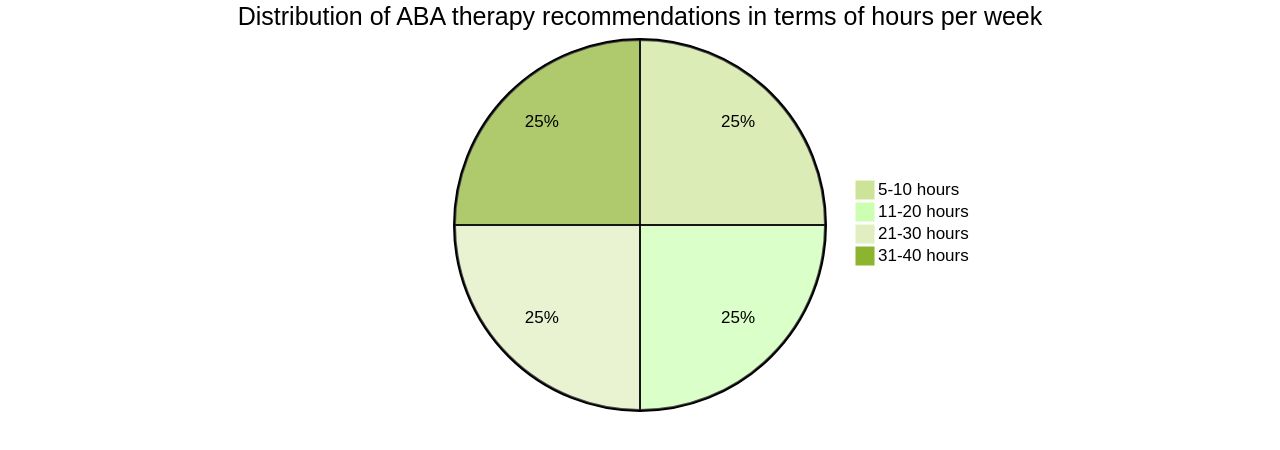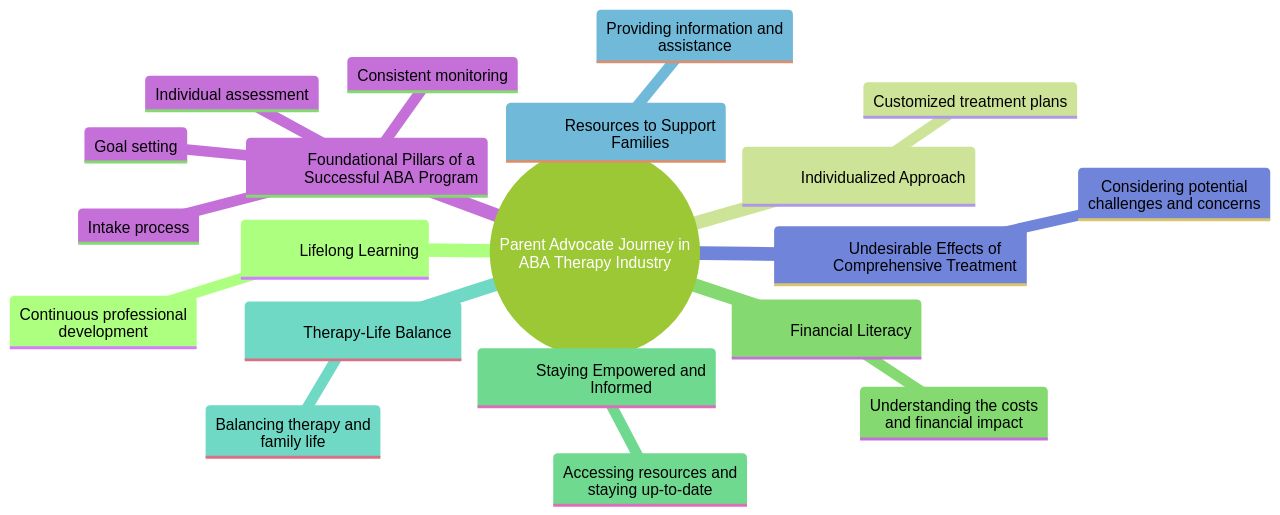Introduction
Applied Behavior Analysis (ABA) therapy is a scientifically validated approach that aids individuals with autism and other neurodevelopmental disorders. It aims to improve social skills, communication, and autonomy, while mitigating challenging behaviors. However, it's crucial to understand that ABA therapy is not a one-size-fits-all solution.
This article will delve into the nuances of ABA therapy, discussing its benefits, potential drawbacks, and the importance of balance between therapy and life. It will also explore the significance of creating an inclusive and collaborative community within the ABA therapy industry, networking and support systems for parent advocates, advocating for accessible ABA therapy services, and the necessity of continuing education and professional development for parent advocates. Join us on this journey to empower parent advocates and ensure the well-being of their children.
Understanding ABA Therapy
Applied Behavior Analysis (ABA) therapy is a scientifically validated approach that aids individuals with autism and other neurodevelopmental disorders. It aims to improve social skills, communication, and autonomy, while mitigating challenging behaviors.
However, it's crucial to understand that ABA therapy is not a one-size-fits-all solution. It's a tailored approach that starts with a comprehensive assessment by a certified professional.
Goals are then established based on the individual's unique needs, and progress is consistently monitored and adjusted. While ABA therapy has proven to be effective for many, it's also faced criticism.
Some argue that it seeks to extinguish behaviors that are part of the individual's identity, such as 'stimming' behaviors, which are coping mechanisms for managing anxiety or sensory overload. Moreover, the recommended hours for ABA therapy can range from 5 to 40 hours per week, which can be a significant intrusion into the family's daily life, impacting social involvement, work schedules, and overall family dynamics.
For instance, families may face challenges like financial strain, coordination of care, and transition planning. Therefore, it's essential to strike a balance between therapy and life for the individual in treatment, their parents, and their siblings. The effectiveness of ABA therapy is still under scrutiny, as existing studies provide mixed outcomes. Some report long-term gains in functioning, while others highlight the negative experiences of autistic children. Therefore, it's important for parent advocates to understand these nuances and make informed decisions to support their children.
Creating an Inclusive and Collaborative Community
The essence of an inclusive, collaborative community within the ABA therapy industry is the exchange of experiences, knowledge, and resources. This fosters a nurturing network that empowers parent advocates, enabling them to engage with other parents, professionals, and organizations for shared insights and resources.
Such collaborations deepen understanding of ABA therapy and its application, ultimately enhancing the progress and well-being of children. Consider the Do Better Collective, an online professional development community, that gathers a diverse group of ABA professionals for collective learning.
This platform provides comprehensive career support, enabling members to navigate professional challenges and apply science-based knowledge to their practice. Similarly, My Collaborative Team offers marketing support to its members, promoting the advancement of the collaborative process.
However, it's worth noting that ABA therapy isn't a 'one size fits all' solution. Different factors can lead to undesired effects on families, such as financial strain, privacy intrusion, and disruption of family dynamics.
Therefore, it's essential to maintain a balance between therapy and life. Moreover, the importance of consistent monitoring and assessment to create personalized plans for each child cannot be overstated. A partnership between therapists and families is crucial, with open communication to ensure everyone is working towards the same goals. When parent advocates partner with organizations like Alliance ABA Therapy, they join a group of experienced therapists that share their family's goals. In conclusion, building an inclusive, collaborative community in the ABA therapy industry is crucial for parent advocates. It provides a platform for shared knowledge and resources, leading to improved understanding and application of ABA therapy, ultimately benefiting the children involved.
Networking and Support Systems
Fostering an inclusive and collaborative community within the ABA therapy industry is essential for empowering parent advocates. These communities serve as a platform for connecting with others navigating similar challenges, sharing experiences, and learning collectively. This collaborative spirit is exemplified by initiatives like the New York Zero-to-Three Network, which champions diversity, equity, and inclusion while promoting the health and well-being of infants, toddlers, and families.
Such robust networks include professionals from diverse fields, strengthening the collective knowledge base and support available. Qualitative studies show that parent advocates play a significant role in supporting families during challenging transitions, offering service-related, concrete, and moral support. These supports help families navigate the system, feel supported, and equip them with the tools necessary to overcome barriers and access resources.
Moreover, organizations like Alliance ABA Therapy provide a rich resource, extending their expertise to the families they serve. However, it's crucial to remember that networking is more than just attending meetings or joining associations. It involves fostering quality relationships, as these connections can introduce you to key people and resources in the industry.
It's an art requiring interpersonal communication skills, not a formulaic approach. In the wave of mental health technology, companies like Cortica are making significant strides, securing funding and acquiring companies to bolster their offering. However, it's crucial to involve mental health clinicians in the process to ensure the tools and technologies being developed truly serve those seeking help.
Lastly, it's worth noting that there isn't a 'one size fits all' approach within ABA. Recommendations need to consider the potential impact on families, including financial implications, privacy concerns, and the effect on familial relationships. Therefore, organizations like Shrewsbury or Springfield offer a variety of services to cater to individual needs and preferences.
Advocating for Accessible ABA Therapy Services
Parent advocates play a pivotal role in ensuring accessible ABA therapy services in their communities. This involves liaising with local organizations, policymakers, and insurance providers to promote awareness about the importance of ABA therapy and the need for accessible services.
For instance, Lexington ABA is committed to equitable access to quality services for all clients and their families. They actively foster an inclusive culture and disseminate this mission to the community.
Advocacy isn't just about lobbying; it's about understanding the unique needs of each child. As such, an effective ABA program is built on several foundational pillars including individual assessment, goal setting, and consistent monitoring.
There are inspiring stories of advocacy efforts leading to positive outcomes for children with autism. For instance, a group of parents in Indiana staged a protest after the state planned to slash reimbursement rates, leading to increased awareness and support for ABA therapy.
Moreover, innovative therapies like music therapy are enhancing the lives of students through sound and vibration. This shows the importance of advocating for diverse therapeutic approaches. However, it's important to remember that there isn't a one-size-fits-all approach within ABA. Recommendations for therapy can range from 5 to 40 hours per week, and it's crucial to consider the potential impacts such comprehensive treatment may have on families. Advocacy should therefore involve promoting a balanced approach that takes into account the diverse needs and circumstances of each family.

Continuing Education and Professional Development
The ABA therapy industry is dynamic, constantly evolving with new insights and advancements. Parent advocates, as key players in this field, need to embrace lifelong learning to ensure they can provide the most effective support.
The Do Better Collective and initiatives like it are paving the way for this educational journey, creating an inclusive online platform for professionals to grow and learn together. This type of community fosters a spirit of collaboration and shared growth, enriching the knowledge base of parent advocates and enhancing their skills.
Professional development isn't limited to online platforms; it also includes participation in workshops, webinars, and conferences. These forums provide invaluable opportunities to learn directly from industry experts, gain insights into the latest research and techniques, and network with other professionals.
However, it's essential to remember that ABA therapy isn't a one-size-fits-all approach. The National Association of Therapeutic Schools and Programs emphasizes the importance of tailoring care and education to the needs of each child and their family.
This individualized approach requires a deep understanding of the complexities of ABA therapy, which advocates can only achieve through continuous education and professional development. Moreover, the financial implications of ABA therapy can't be ignored. As industry statistics reveal, more than 23.9% of therapists were reimbursed less than $100 per hour in recent years. Therefore, parent advocates must also develop financial literacy to navigate these challenges and ensure sustainable, effective support for their children. In summary, the journey of a parent advocate in the ABA therapy industry is a lifelong commitment to learning, growth, and adaptation. By embracing this journey, parent advocates can stay empowered, informed, and equipped to provide the best support for their children.

Conclusion
In conclusion, it is important for parent advocates to understand the nuances of ABA therapy and make informed decisions to support their children. ABA therapy is a tailored approach that aims to improve social skills, communication, and autonomy while mitigating challenging behaviors.
However, it is not a one-size-fits-all solution. Building an inclusive and collaborative community within the ABA therapy industry is crucial for parent advocates.
This community provides a platform for shared knowledge and resources, leading to improved understanding and application of ABA therapy. It also allows parent advocates to connect with others facing similar challenges and access support networks.
Advocacy plays a pivotal role in ensuring accessible ABA therapy services in communities. Parent advocates can liaise with local organizations, policymakers, and insurance providers to promote awareness about the importance of ABA therapy and the need for accessible services.
It is essential to consider the unique needs of each child when advocating for therapy. Continuing education and professional development are vital for parent advocates in the ever-evolving field of ABA therapy. Embracing lifelong learning through online platforms, workshops, webinars, and conferences allows parent advocates to stay informed about new insights and advancements in the industry. Financial literacy is also important for navigating the financial implications of ABA therapy. Overall, by embracing these principles, parent advocates can empower themselves with knowledge, resources, and support systems to ensure the well-being of their children. The journey of a parent advocate in the ABA therapy industry is a lifelong commitment to learning, growth, and adaptation.




